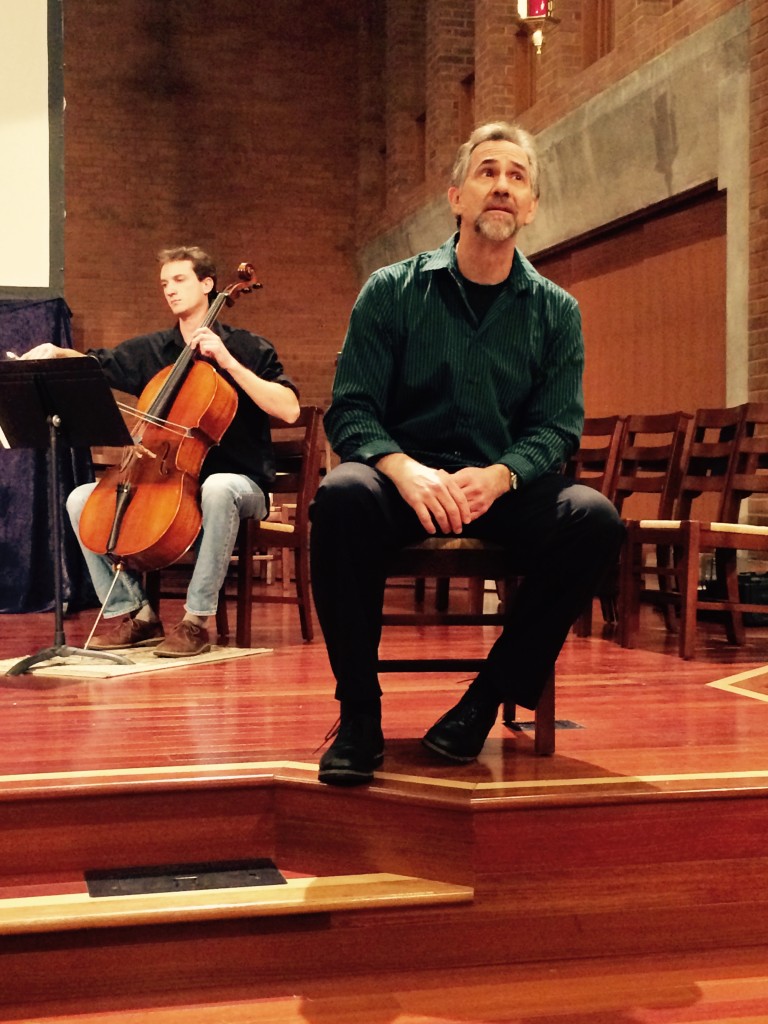Voice Behind the Cello
By Chris Yoder
June 2, 2015
(Chris Yoder is one of two cellists who alternately plays “the son” in Listening for Grace. The following is a repost of an editorial by Chris for The Weather Vane at Eastern Mennonite University.)
Ted Swartz is bringing his show, “Listening for Grace,” to EMU this Sunday evening. It is a show full of emotions – laughter, joy, pain, remorse, sadness, and grace. He twists your goosebumps into tears of sadness, only to find transform them into tears of laughter.
Swartz plays the role of a father rooted in an evangelical upbringing, and he is forced to cope with the news that his son is gay. Throughout the play, he consults with friends and family, confronting the dillemma of choosing between his God or his son.
While I won’t be playing in the show at EMU, I’ve had the opportunity to travel with Swartz and perform as the gay son in a number of plays in different parts of the country.
 What intrigues me and surprises me, however, are the responses I receive after each show.
What intrigues me and surprises me, however, are the responses I receive after each show.
We mingle with the crowd following each play, and without fail, the viewers assume my sexual orientation based on the role I play in the show. I have had people ask me to gay bars after shows. I have had people refuse to shake my hand. I have had people express undue sympathy – sympathy I feel that I do not deserve.
But in experiencing these responses, my perception as a straight man is now complemented by the experience of living with the label of “homosexual.” I will tell you, above every other problem that the church currently faces, the labeling of those who identify as homosexual is stifling. It suppresses the individual.
After a particular show in Ohio, two people of very different mentalities confronted me. One person approached me and did nothing but glance vaguely in my direction, refuse the handshake that I offered, sneer in disgust, and walk away with a purpose in his step.
While I do not always like to assume the intentions behind a person’s actions, I cannot help but think that the label placed upon me by the show influenced his decisions while in my presence. The label overrode anything that told him to treat me as an individual.
Another person, after the same show, confronted me and expressed an unneeded amount of sympathy as to the struggle I was most certainly going through. It must be hard to deal with the criticism coming from the church, she told me.
While one of these experiences could perhaps come across as worse than the other, harsher than the other, I would lean towards grouping them in the same category.
With both of these people, the label of “homosexual” dictated their relationship with me more so than I did as a person standing in front of them.
And this label, even among people who consider themselves members of the cause to promote universal acceptance in the church, still rests heavy on those who are sexually oriented in a way formerly thought to be queer or sinful. I have now experienced some of the weight, and it is not an easy weight to bear.
I never thought that I, as a straight man, would ever have the opportunity to fully experience the difficulties present for homosexual individuals in the church.
I have never condoned actions I did not understand – acceptance was something I was taught and to which I attempt to adhere. But now, for a short time on stage, I must fully become a gay man, and deal with the responses of people afterwards.
And with that, a world formerly unknown to me has opened its curtain. And that new world is not an easy one to step into. It is a world full of misled assumptions and steep, rocky, terrain.

I am not Mennonite nor have I seen your play but I can appreciate the great opportunity your experience has provided you. It is not often that we can truly walk in someone else’s shoes although we often claim nobility for trying. Thank you for a wonderful editorial.